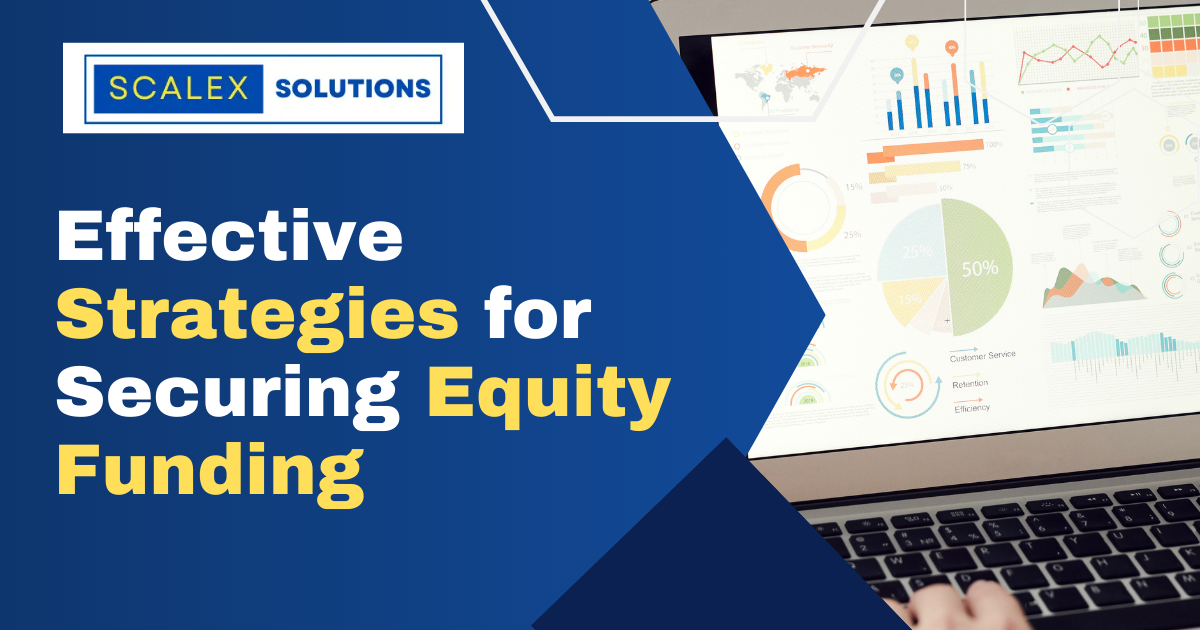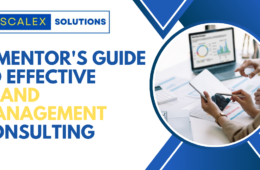 June 5, 2024
June 5, 2024
For the past decade, equity funding has played a transformative role in shaping the business and startup landscape in India’s capital. Equity fund consultants in Delhi played a particularly prominent role in that. With their business mentoring services, as well as by playing the part of a business growth mentor, firms such as ScaleX Solution have helped equity funding emerge as a vital source of funding. This, as such, has revolutionized the way entrepreneurs launch and scale their ventures and businesses–one that is also supported by the nation’s positive economic outlook as a whole.
Nevertheless, I know what you must be thinking:
What is Equity Financing?
Equity financing, or equity funding, is another mode through which businesses can seek capital for a startup organization. These funds can be for anything from company necessities to running and expanding long-term operations. But how is this capital raised? This is achieved through exchanging a portion of the company’s ownership (equity financing) for cash from investors. For the unsophisticated, it refers to selling equity in the company for cash; but doing so without debt.
Benefits of Equity Funding:
Equity funding, or equity investment, offers several key benefits that make it an attractive option for startups.
The first of these would be access to capital. Equity funding provides startups with a substantial amount of capital to fuel their growth. Such an influx can be, as mentioned previously, utilized for various purposes, including but not limited to growth and expansion, and scaling operations.
The second advantage would be a shared sense of risk and responsibility. Since equity funding involves investors buying a stake in the company, the burden of the borrowed funds gets distributed across multiple stakeholders, which thereby creates a collaborative synergy amongst everyone involved–with the success and profit of the company being the common goal.
The third and perhaps least discussed potential benefit of equity funding is the help that experienced investors can offer to a firm. Equity financing is less risky than, say, getting a loan from a financial or banking institution. Investors here therefore are typically more invested in the business’s success, offering valuable expertise, insights, and networks. Their returns, you see, are directly tied to the company’s success, thereby also aligning their interests with the growth and prosperity of the business.
Lastly, Equity funding also provides the potential for long-term growth. With the company succeeding, the value of stakes increases, and investors get greater returns on their investment through dividends and appreciation.
Key Strategies for Securing Equity Funding
While Equity financing is often the most desired funding outcome for most MSMEs and startups, navigating its complex landscape requires a strategic approach. Therefore, in this article, we will be talking about key strategies, when it comes to equity funding. This includes points such as mapping a clear business road map, conducting research and documentation, finding the right investors, making the perfect presentation pitch, understanding valuation and equity allocation, preparing thorough due diligence materials, negotiating term sheets and partnership agreements, and other post-funding processes.
Therefore, understanding and implementing these tips and strategies will ensure that you are
thoroughly prepared for success–even before approaching investors for funds.
Step 1: Having a Clear Roadmap in Place:
The first step when it comes to raising funds for equity investing is to understand what success looks like for you. This includes having clarity over the type of investment you are seeking, the amount of shares that you are willing to let go of, and whether you are seeking guidance beyond investment. Having answers to these acts as a litmus test–especially regarding the clarity of your plan in action and future execution.
Step 2: Research and More Research:
Once we have a plan in place, the next step would be to identify the right investors–for which strategic research and understanding are key. Remember to conduct thorough and due diligence, as you explore relevant industry-specific investors, their track records, and criteria. Networking alongside research also plays a vital role. However, if uncertainties persist, you can always take the help of ScaleX Solutions, premier equity fund consultants in Delhi, and your business growth mentor. From building relationships to finding investors who share your vision, ScaleX Solutions has got you covered.
Step 3: Coming up with a Compelling Presentation Pitch:
Once you have tempted the investors, the next thing to do is present them with a deal they cannot afford to let go of. That starts with a clear and compelling presentation. But to gain this perfection, it calls for hard work and special attention to be paid when identifying key features and benefits, such as Unique Selling Propositions (USPs). Our pitch deck principles should include important elements such as market opportunity, growth strategy, and business model. One tip that we would provide is to tell a good story, one that would be interesting enough to capture the investor’s attention as well as having the right story to implement the investor’s passion as well as the promise to fulfil their needs and wants.
Step 4: Understanding Valuation and Striking Balance:
After having wowed investors with a bedazzling presentation pitch, the next thing that MSMEs and other startups need to understand is the different valuation methods, beginning with discounted cash flow (DCF) analysis or comparable company analysis. While this will help in determining the worth of your company, know that it is also important to strike a balance between expectations and potential. So negotiate favourable equity terms, in a way that there is a mutually beneficial outcome.
Step 5: Prepare Relevant Documentation and Information:
We are almost there. Relax and take a deep breath. For now, it is all about organizing financial statements, and business plans, showcasing growth projections, legal contracts, and all that jazz. Present information in a clear, concise, and structured manner. Moreover, be prepared for potential due diligence from investors–that helps highlight your preparedness, and commitment to transparency, as well as the professionalism of the materials presented.
Step 6: Understanding the Term Sheet and Utilizing Negotiation Effectively:
Attention post: all these should turn to understanding the term sheet and the critical aspects of the partnership agreement. Seek advice in this step, possibly from a business growth mentor. And if you are from the capital state, you can also take the help of equity fund consultants in Delhi, Contact Scalex Solutions. Consider all aspects, like equity allocation, and board representation, and remember that the agreement must work for all. This includes not just you, but also the investors and your business in general. Therefore, engage in constructive and transparent discussions to find mutually beneficial solutions.
Words of Advice for Post-Funding Considerations:
Once equity funding is secured, what becomes imperative from this point onwards is managing and maintaining expectations. For that to happen smoothly, ensure regular and open communication with investors. Provide them updates, and actively seek their guidance and mentorship. Moving beyond that, also be on the lookout for potential collaborations with the investor network itself, thereby maximising the value beyond just their capital infusion.
Follow Us on Linkedin












